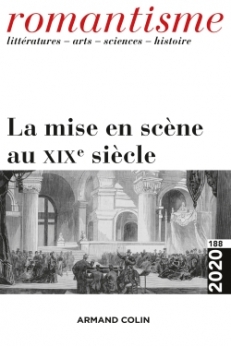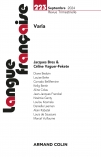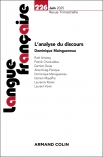
Romantisme n°188 (2/2020)
Pour acheter ce numéro, contactez-nous
Recevez les numéros de l'année en cours et accédez à l'intégralité des articles en ligne.
Cette contribution entend réexaminer l’activité du Théâtre d’Art dirigé par Paul Fort entre 1890 et 1892 à l’aune des travaux récents portant sur l’histoire de la mise en scène, non tant pour lui revendiquer une place de « pionnier » dans l’émergence de la mise en scène moderne, que pour compléter le tableau de nos connaissances sur la vie théâtrale de la fin du XIXe siècle, en essayant de mieux cerner les pratiques qui y furent expérimentées. Après avoir considéré la variété des définitions explicites ou implicites du processus de mise en scène évoquées par les programmes, articles de presse et souvenirs des témoins, l’auteur s’intéresse à la revendication d’une approche « dramaturgique » (au sens contemporain d’analyse du matériau textuel ayant vocation à orienter la réalisation de la représentation), puis au statut revendiqué pour les personnes chargées de l’« ordonnance scénique » (Paul Fort, Pierre Quillard, Paul-Napoléon Roinard, Adolphe Retté, Charles Morice, etc.).
This paper focuses on re-examining Paul Fort’s activities at the Théâtre d’Art he directed between 1890 and 1892, in the light of recent work on the history of performance, not so much in order to vindicate for him the status of a « pioneer » in the emergence of modern stage directing, as to fill out our understanding of theatrical life at the end of the 19th century, by trying to better discern the practices experimented with at that time. After having considered the variety of explicit or implicit definitions of « mise en scène » or stage directing that theatre programmes, press articles, and memoirs evoke, the author turns first to the vindication of a « dramaturgical » approach (in the contemporary meaning of the term, that is the analysis of texts whose goal is to guide performance), and then to the recognition asked for by the people in charge of the « ordonnance scénique » (stage organisation) – Paul Fort, Pierre Quillard, Paul-Napoléon Roinard, Adolphe Retté, Charles Morice, etc.

